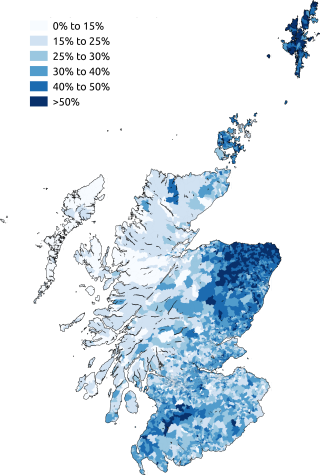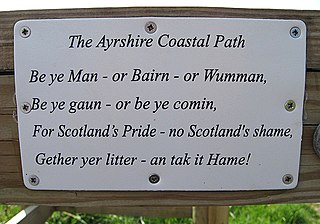Related Research Articles

Scots is a language variety descended from Early Middle English in the West Germanic language family. Most commonly spoken in the Scottish Lowlands, the Northern Isles of Scotland, and northern Ulster in Ireland, it is sometimes called: Lowland Scots, to distinguish it from Scottish Gaelic, the Celtic language that was historically restricted to most of the Scottish Highlands, the Hebrides, and Galloway after the sixteenth century; or Broad Scots, to distinguish it from Scottish Standard English. Modern Scots is a sister language of Modern English, as the two diverged from the same medieval form of English.

Ulster Scots or Ulster-Scots, also known as Ulster Scotch and Ullans, is the dialect spoken in parts of Ulster, being almost exclusively spoken in parts of Northern Ireland and County Donegal. It is normally considered a dialect or group of dialects of Scots, although groups such as the Ulster-Scots Language Society and Ulster-Scots Academy consider it a language in its own right, and the Ulster-Scots Agency and former Department of Culture, Arts and Leisure have used the term Ulster-Scots language.

Galashiels is a town in the Scottish Borders with a population of around 12,600. Its name is often colloquially shortened to "Gala". The town is a major commercial centre for the Borders region with extensive history in the textile industry. Galashiels is the location of Heriot-Watt University's School of Textiles and Design.

Scotland is internationally known for its traditional music, often known as Scottish folk music, which remained vibrant throughout the 20th century and into the 21st when many traditional forms worldwide lost popularity to pop music. Traditional Scottish music comprises a variety of different styles such as ballads, reels, jigs and airs. Traditional Scottish music is closely associated with the bagpipes which is credited as having a prominent role in traditional music originating from the country. The bagpipes are considered to an "iconic Scottish instrument" with a history dating back to the 15th century. Other notable Scottish instruments include the tin whistle, the accordion and the fiddle.

Scottish folk music is a genre of folk music that uses forms that are identified as part of the Scottish musical tradition. There is evidence that there was a flourishing culture of popular music in Scotland during the late Middle Ages, but the only song with a melody to survive from this period is the "Pleugh Song". After the Reformation, the secular popular tradition of music continued, despite attempts by the Kirk, particularly in the Lowlands, to suppress dancing and events like penny weddings. The first clear reference to the use of the Highland bagpipes mentions their use at the Battle of Pinkie Cleugh in 1547. The Highlands in the early seventeenth century saw the development of piping families including the MacCrimmons, MacArthurs, MacGregors and the Mackays of Gairloch. There is also evidence of adoption of the fiddle in the Highlands. Well-known musicians included the fiddler Pattie Birnie and the piper Habbie Simpson. This tradition continued into the nineteenth century, with major figures such as the fiddlers Niel and his son Nathaniel Gow. There is evidence of ballads from this period. Some may date back to the late Medieval era and deal with events and people that can be traced back as far as the thirteenth century. They remained an oral tradition until they were collected as folk songs in the eighteenth century.

"Auld Lang Syne" is a Scottish song. In the English-speaking world, it is traditionally sung to bid farewell to the old year at the stroke of midnight on New Year's Eve/Hogmanay. By extension, it is also often heard at funerals, graduations, and as a farewell or ending to other occasions; for instance, many branches of the Scouting movement use it to close jamborees and other functions.
Flowers of the Forest, or The Fluuers o the Forest, is a Scottish folk tune and work of war poetry commemorating the defeat of the Scottish army, and the death of James IV, at the Battle of Flodden in September 1513. Although the original words are unknown, the melody was recorded c. 1615–1625 in the John Skene of Halyards Manuscript as "Flowres of the Forrest", although it might have been composed earlier.

Luke Kelly was an Irish singer, folk musician and actor from Dublin, Ireland. Born into a working-class household in Dublin city, Kelly moved to England in his late teens and by his early 20s had become involved in the folk music revival there. Returning to Dublin in the 1960s, he became a founding member of the band The Dubliners in 1962. The Irish Post and other commentators regard Kelly, known for his distinctive singing style and sometimes political messages, as one of Ireland's greatest folk singers.

The Irish Rovers is a group of Irish musicians that formed in Toronto, Canada in 1963 and named after the traditional song "The Irish Rover". They are best known for their international television series, contributing to the popularization of Irish Music in North America, and for the songs "The Unicorn", "Drunken Sailor", "Wasn't That a Party", "The Orange and the Green", "Whiskey on a Sunday", "Lily the Pink", "Finnegan's Wake" and "The Black Velvet Band".
"The Bonnie Earl o' Moray" is a popular Scottish ballad, which may date from as early as the 17th century.
Craic or crack is a term for news, gossip, fun, entertainment, and enjoyable conversation, particularly prominent in Ireland. It is often used with the definite article – the craic – as in the expression "What's the craic?", meaning "How are you?" or "What's happening?". The Scots and English crack was borrowed into Irish as craic in the mid-20th century and the Irish spelling was then reborrowed into English. Under both spellings, the term has become popular and significant in Ireland.
"The Parting Glass" is a Scottish traditional song, often sung at the end of a gathering of friends. It has also long been sung in Ireland, where it remains popular; this has strongly influenced how it is often sung today. It was purportedly the most popular parting song sung in Scotland before Robert Burns wrote "Auld Lang Syne".

"The Hundred Pipers" is a Scottish song and jig attributed to Carolina Nairne, Lady Nairne and popularised from 1852 onwards. It takes as its themes events during and after the Jacobite Rising of 1745.
The Bonnie Lass o' Fyvie is a Scottish folk song about a thwarted romance between a soldier and a woman. Like many folk songs, the authorship is unattributed, there is no strict version of the lyrics, and it is often referred to by its opening line "There once was a troop o' Irish dragoons". The song is also known by a variety of other names, the most common of them being "Peggy-O", "Fennario", and "The Maid of Fife".

A bawbee was a Scottish sixpence. The word means a debased copper coin, valued at six pence Scots, issued from the reign of James V of Scotland to the reign of William II of Scotland. They were hammered until 1677, when they were produced upon screw presses.

A shieling is a hut or collection of huts on a seasonal pasture high in the hills, once common in wild or sparsely populated places in Scotland. Usually rectangular with a doorway on the south side and few or no windows, they were often constructed of dry stone or turf. More loosely, the term may denote a seasonal mountain pasture for the grazing of cattle in summer. Seasonal pasturage implies transhumance between the shieling and a valley settlement in winter. Many Scottish songs have been written about life in shielings, often concerning courtship and love. The ruins of shielings are abundant landscape features across Scotland, particularly the Highlands.

The Stork Fountain is located on Amagertorv in central Copenhagen, Denmark. It was a present to Crown Prince Frederik and Crown Princess Louise in connection with their silver wedding anniversary in 1894. It depicts three storks about to set off.

Modern Scots comprises the varieties of Scots traditionally spoken in Lowland Scotland and parts of Ulster, from 1700.
Marion Emily Angus (1865–1946) was a Scottish poet who wrote in the Scots vernacular or Braid Scots, defined by some as a dialect of English and others as a closely related language. Her prose writings are mainly in standard English. She is seen as a forerunner of a Scottish Renaissance in inter-war poetry – her verse marks a departure from the Lallans tradition of Robert Burns towards that of Hugh MacDiarmid, Violet Jacob and others.

The statue of Robert Burns in Milwaukee, Wisconsin, is a work of public art by the Scottish artist William Grant Stevenson, RSA. The statue is a memorial to the poet, bard, and Scotsman Robert Burns. The bronze statue stands upon a plinth of Nova Scotia pink granite. The plinth is adorned with two bronze bas relief panels depicting scenes from Burns' poetry. The monument was donated to the City of Milwaukee by James A. Bryden.
References
- ↑ Campbell, Aileen (1994). The Wee Scot Book: Scottish Poems and Stories. Pelican Publishing. p. 32. ISBN 978-1-4556-1395-3.
- 1 2 "15 famous songs every Scot will know". Scotsman.com. Archived from the original on 30 April 2019. Retrieved 29 November 2024.
- ↑ Gilly Pickup (2024). Tipsy Lairds and Rumbledethumps: Scotland's Food and Drink. Amberley Publishing Limited. p. 27-28. ISBN 978-1-3981-1778-5.
- ↑ "Legend of sweetie salesman unwrapped". Archived from the original on 19 October 2013. Retrieved 18 October 2013.
- ↑ "Coulter's Candy". Sangstories.webs.com. Retrieved 18 October 2013.
- ↑ "Ally Bally Bee writer tribute unveiled in Galashiels". BBC News . 20 September 2019. Retrieved 20 December 2023.
- ↑ Hodgson, Callum (20 September 2019). "Hundreds turn out for Coulter's Candy statue unveiling in Galashiels". Border Telegraph. Retrieved 21 December 2023.
- ↑ Thomson, Mike (23 April 2024). "Galashiels: Robert Coltart headstone unveiled on anniversary". Border Telegraph. Retrieved 5 May 2024.
- ↑ "Robin Hall And Jimmie MacGregor With The Galliards – Scottish Choice". Discogs. 1961. Retrieved 1 May 2019.
- ↑ Norman Buchan (1962). 101 Scottish Songs. Collins. ISBN 978-0008136611.
- ↑ James T. R. Ritchie (1964). The Singing Street (First ed.). Oliver & Boyd. ISBN 978-0050011508.
- ↑ "Voice of an Angel – Catherine McKinnon – Songs, Reviews, Credits". AllMusic. Retrieved 1 May 2019.
- ↑ "The First of the Irish Rovers – The Irish Rovers – Songs, Reviews, Credits". AllMusic. Retrieved 1 May 2019.
- ↑ "The Irish Rovers – The First Of The Irish Rovers". Discogs. 1966. Retrieved 1 May 2019.
- ↑ "The Kerries – Coulters Candy". 45cat.com. Retrieved 1 May 2019.
- ↑ "HMS Donovan – Donovan – Songs, Reviews, Credits". AllMusic. Retrieved 1 May 2019.
- ↑ "Hamish Imlach – Cod Liver Oil & Orange Juice – The Transatlantic Anthology". Discogs. Retrieved 1 May 2019.